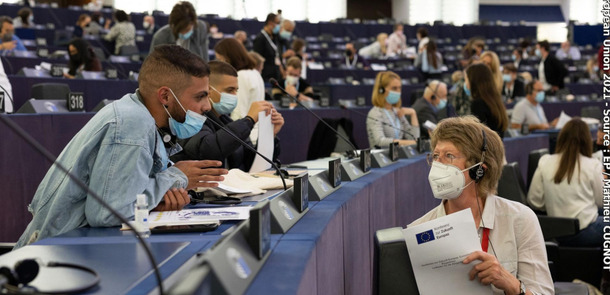The debt crisis in Greece has escalated dramatically. German-Greek relations have reached rock bottom. It was before this political backdrop that the Bertelsmann Stiftung presented their project “Social Inclusion Monitor Europe” for the first time, in the Greek capital.
On 19th March 2015, the Bertelsmann Stiftung, in cooperation with the Hellenic Foundation for European and Foreign Policy ELIAMEP and daily newspaper Ta Nea, issued an invitation to joint discussions on overcoming the social crisis in Greece, to be held at the Acropolis Museum in Athens. More than 100 participants accepted this invitation.
Greece bottom of Social Justice Index
The event was opened by Daniel Schraad-Tischler and Christian Kroll of the Bertelsmann Stiftung, who presented the results of the “Social Justice Index”, published in September 2014. In this study, Greece ranked bottom of all 28 EU member states.
The ensuing panel discussion was chaired by Dimitris Mitropoulos, executive director of Ta Nea, with the following high-ranking experts taking part: Professor Loukas Tsoukalis, President of ELIAMEP; Philippos Sachinidis, former finance minister; Ioannis Panagopoulos, chairman of the federation of trade unions GSEE; and Andrej Stuchlik of Bertelsmann Stiftung.
Unemployment as the central problem
The greatest socio-political problem in Greece was considered to be the high level of unemployment, especially amongst young people. Over 70 percent of the unemployed were long-term unemployed. In addition, Greece was experiencing a “brain drain” of highly qualified young people. Even for those in employment the situation has worsened considerably. Since the beginning of the crisis, wage levels have dropped by about 20 to 30 percent, depending on the sector.
Causes of social imbalance
The causes of the current social imbalance are not only attributable to the economic and financial crisis; they are equally the result of previously existing domestic factors. Economic growth is essential for job creation. The development of competitive and innovative medium-sized enterprises could provide important Stimuli.
What should the EU’s role be?
The European Union can only play a limited role in respect of socio-political measures, because, to a great extent, social policy is the responsibility of the member states. Andrej Stuchlik proposed that in the same way as the EU has a budgetary oversight function, it should also monitor the area of social imbalance, in order to prevent EU member states from drifting into situations of greater social polarisation.
At the reception afterwards, the very objectively conducted discussion was continued in numerous bilateral conversations. There are plans for SIM Europe to organise further events in other capitals.






